M. L. Liebler at St. Clair Shores Library
Longtime P&W-supported sponsor and writer M. L. Liebler, author of fourteen books of poetry including The Moon A Box, which received the 2005 Patterson Poetry Award of Excellence, blogs about his monthly workshop at St. Clair Shores Library in St. Clair Shores, Michigan.
They all gathered, once again, as they have on the third Wednesday of the month for the past twenty-one years. Students, mothers, senior citizens, retired politicians, teachers, librarians, real estate agents, retired cops, and the occasional visitor who heard about us and wanted to “check us out.” Last night’s visitor was a fellow named Skippy, a retired Navy man from Connecticut who was so impressed with the quality of the work he heard and read that he politely asked if he could publish some of it in his church paper back home.
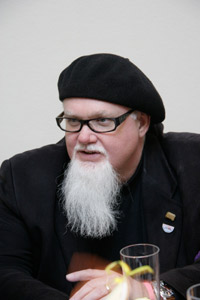 I love these folks. I have met monthly with them as a small way of giving back to the community where I was raised and still proudly live. In fact, I live in the same house that my wife grew up in, and where I walked to every night while dating her when we were fifteen-year-olds.
I love these folks. I have met monthly with them as a small way of giving back to the community where I was raised and still proudly live. In fact, I live in the same house that my wife grew up in, and where I walked to every night while dating her when we were fifteen-year-olds.
Last night we heard and workshopped wonderful poems by the former County Commissioner who lamented the destruction of the ecology of America by contrasting it with the beauty of Spain’s wide-open spaces and well-kept urban areas. After this piece, a widow read her satirical poem about a suburban man who lives his life in a rush and doesn’t realize the beauty around him.
Another cool, outside the box, poem was a wonderfully rich work entitled "The Ascetic Life" by a retired librarian who explored the contemplative life of a “Holy Fool.” A young teenager read a poem that was written to get “something off [her] chest.” It was a poem about how her younger sister has continually belittled her and put her down her entire life. The poem was her empowering response that she “wasn’t going to take it anymore.” The poem received cheers from the seniors and an “I know exactly what you mean” acknowledgement from another teen in attendance.
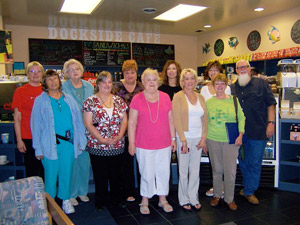 The evening concluded with another moving poem from one of our newer regulars, an eight-six-year-old widower who never wrote a poem in his life until he joined our group. He wrote about frequently waking up thinking there were “a lot of people in [his] house,” only to realize that he was alone.
The evening concluded with another moving poem from one of our newer regulars, an eight-six-year-old widower who never wrote a poem in his life until he joined our group. He wrote about frequently waking up thinking there were “a lot of people in [his] house,” only to realize that he was alone.
To quote Walt Whitman, “Have you ever felt so good to get at the heart of poem?” These people, young and old, are doing just that, and the great majority of them have never written a poem in their lives until now. I am grateful and honored to spend time with this diverse and welcoming group of poets. For me, this is where the real poetry in America lives!
Photos: (Top) M. L. Liebler. (Bottom) M. L. Liebler with workshop participants. Credit: Pamela Liebler.
Support for Readings/Workshops events in Detroit, is provided by an endowment established with generous contributions from the Poets & Writers Board of Directors and others. Additional support comes from the Friends of Poets & Writers.






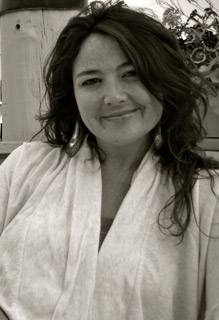 What techniques do you employ to help writers open up?
What techniques do you employ to help writers open up?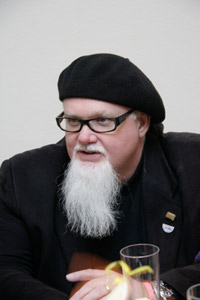 The Detroit poetry scene started to gain recognition among nontraditional audiences in 1987. Shortly thereafter, P&W expanded to the city to further stimulate the funding culture and help local arts organizations such as the National Writer’s Voice Project, Terry Blackhawk’s school-aged
The Detroit poetry scene started to gain recognition among nontraditional audiences in 1987. Shortly thereafter, P&W expanded to the city to further stimulate the funding culture and help local arts organizations such as the National Writer’s Voice Project, Terry Blackhawk’s school-aged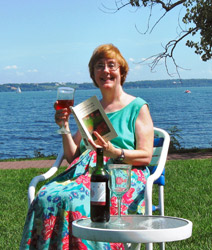 We plunge into our topic: "Telling the Stories of our Lives: Writing the Personal Memoir." After some discussion, we start an exercise. Following the guided visualization, everyone is asked to write from a childhood memory. As we’re beginning, a woman and her twelve-year-old daughter join us, apologizing for their lateness. I initiate introductions, settle the latecomers into chairs, bring them briefly up to speed, then encourage them both to start writing. The mother goes ahead, but the girl just sits, looking scared and confused. We’d advertised the workshop to all ages, but she's the only youngster. Her mother said she loves to write, but right now I know exactly how she’s feeling, afraid of embarrassing herself, of doing it "wrong."
We plunge into our topic: "Telling the Stories of our Lives: Writing the Personal Memoir." After some discussion, we start an exercise. Following the guided visualization, everyone is asked to write from a childhood memory. As we’re beginning, a woman and her twelve-year-old daughter join us, apologizing for their lateness. I initiate introductions, settle the latecomers into chairs, bring them briefly up to speed, then encourage them both to start writing. The mother goes ahead, but the girl just sits, looking scared and confused. We’d advertised the workshop to all ages, but she's the only youngster. Her mother said she loves to write, but right now I know exactly how she’s feeling, afraid of embarrassing herself, of doing it "wrong."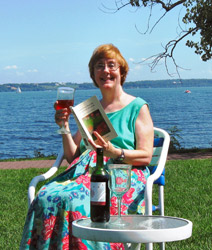 It's a poet’s world. Making connections with other poets and writers, though, isn't easy. Without the kinds of venues more urban areas can sustain, this loose collection of hamlets, villages, townships, and two small cities, Auburn and Geneva, has had no central clearinghouse for writers.
It's a poet’s world. Making connections with other poets and writers, though, isn't easy. Without the kinds of venues more urban areas can sustain, this loose collection of hamlets, villages, townships, and two small cities, Auburn and Geneva, has had no central clearinghouse for writers.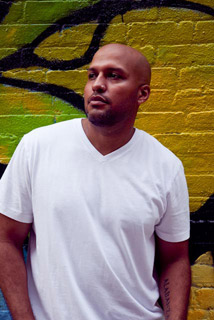 reading dos?
reading dos?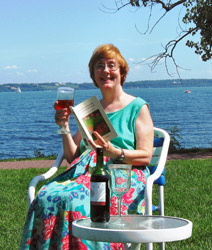 I’d written a grant proposal to Poets & Writers for a three-week workshop: Writing Your Way Through History, the first program ever held in the museum. I showed up at the appointed time, fully expecting no one to be there. In semi-rural areas, the hardest aspect of putting on an event is publicizing it, and we hadn’t done much. Even so, right on the dot, several people climbed the stairs to meet me. A short while later a few others arrived. In all, seven people attended at least part of the program, including a fourth-grader, granddaughter of a Terwilliger Museum member. Armed with a sheet of writing prompts I’d given them, participants explored the museum, searching for characters and stories amongst the museum’s holdings. After an hour, we retired to a cozy nook with tables and chairs in the library adjacent to the museum, an ideal writing space.
I’d written a grant proposal to Poets & Writers for a three-week workshop: Writing Your Way Through History, the first program ever held in the museum. I showed up at the appointed time, fully expecting no one to be there. In semi-rural areas, the hardest aspect of putting on an event is publicizing it, and we hadn’t done much. Even so, right on the dot, several people climbed the stairs to meet me. A short while later a few others arrived. In all, seven people attended at least part of the program, including a fourth-grader, granddaughter of a Terwilliger Museum member. Armed with a sheet of writing prompts I’d given them, participants explored the museum, searching for characters and stories amongst the museum’s holdings. After an hour, we retired to a cozy nook with tables and chairs in the library adjacent to the museum, an ideal writing space.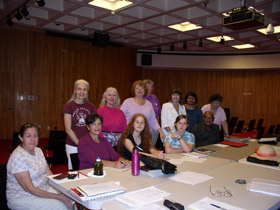
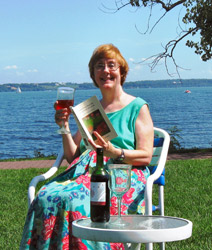 I eat my picnic lunch at a table outside the adorable structures (Baby Bear is as big as a child’s playhouse) savoring sunshine and drifting leaves. Spotting a tiny thrift shop across the street, I'm there in a flash. It’s full of almost all new clothes, each item a dollar! Soon, clutching five items, I approach a sweet-faced lady in her 80s who serves as volunteer cashier. Suddenly I realize I've left home with no cash! The thrift shop does not accept credit cards or checks. The cashier tells me I can come back later to pay. "We close at one.” I say, "But I'm doing a poetry reading at the
I eat my picnic lunch at a table outside the adorable structures (Baby Bear is as big as a child’s playhouse) savoring sunshine and drifting leaves. Spotting a tiny thrift shop across the street, I'm there in a flash. It’s full of almost all new clothes, each item a dollar! Soon, clutching five items, I approach a sweet-faced lady in her 80s who serves as volunteer cashier. Suddenly I realize I've left home with no cash! The thrift shop does not accept credit cards or checks. The cashier tells me I can come back later to pay. "We close at one.” I say, "But I'm doing a poetry reading at the